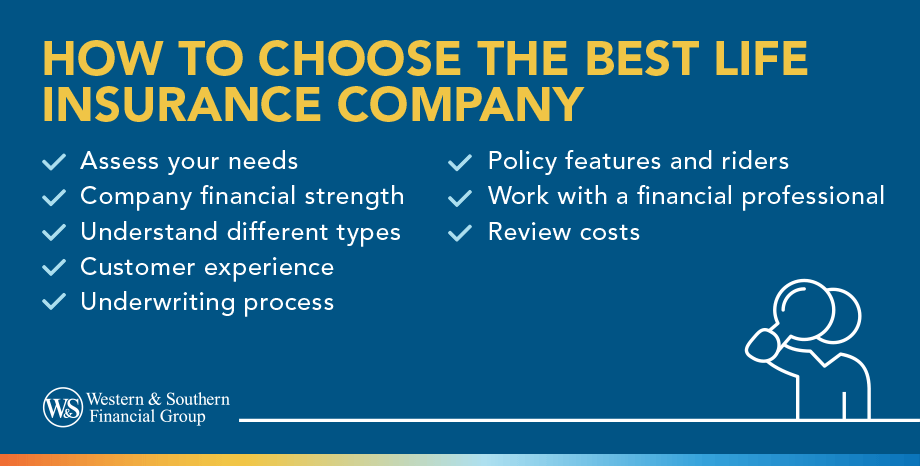

Key Takeaways
- Choose a company with strong financial ratings so you can count on them to pay your policy when your family needs it - no matter how far in the future.
- Look for excellent customer service by choosing a company with high satisfaction ratings that makes it easy to file claims, get support, and manage your policy online.
- Make sure the insurer offers the type of life insurance that aligns with your financial goals and stage of life.
- If you have health concerns or want a quicker application, choose an insurer with flexible or no-medical-exam underwriting options.
- Inquire about "riders" for added policy benefits like early death benefit access, child coverage, or premium waivers if disabled.
Life insurance can be one of the most important purchases you ever make. But choosing the right company? That’s where things get tricky. With dozens of life insurance providers promising the best policies, rates, and features, how do you know who to trust?
In this guide, we’ll walk you through how to choose the best life insurance company based on your goals, your health, and your financial strategy. Whether you're planning ahead for funeral expenses, looking to build cash value, or seeking to help yourself feel more secure, we’ll help you cut through the noise and make a confident, informed decision.
Why Choosing the Right Life Insurance Company Matters
The company behind your life insurance policy isn’t just a name on a piece of paper - it’s your family’s financial cushion. And not all life insurance companies are created equal. Here’s why it matters:
- Financial Strength: You need a company with a solid track record of paying out claims - no matter what the market looks like.
- Customer Satisfaction: The best insurers are known for their responsive customer service and clear communication.
- Policy Options: From term life insurance to whole life to indexed universal life, you want flexibility that fits your life stages.
- Fair Underwriting: Especially if you have medical conditions, the company’s approach to underwriting can make a big difference in eligibility and premiums.
A trusted provider means reliable benefits, manageable costs, and secure coverage—not just now, but decades into the future.
Choosing a life insurance company doesn’t have to feel overwhelming. Follow these steps to confidently narrow your options and find a provider that aligns with your financial goals, health needs, and personal preferences.
Step 1: Assess Your Life Insurance Needs
Before jumping into picking the insurance company, it's essential to take a moment to figure out what you really need.
Ask yourself the following questions:
- How much coverage should you go for? Think about your debts, replacing your income, covering education expenses and any future financial responsibilities you may face.
- What kind of life insurance are you looking for? Are you leaning towards term life insurance for short-term, or do you prefer a permanent policy that accumulates cash value over the years?
- How much are you comfortable spending on premiums? Think about what fits your monthly or yearly budget without putting a strain on your other financial plans.
Step 2: Evaluate Financial Strength
The next step is to make sure the insurer is built to last. A life insurance policy is a long-term commitment and you want to know your provider will still be around 20, 30, or even 50 years from now.
Check independent rating agencies like:
- A.M. Best
- Moody’s
- Fitch Ratings
- Standard & Poor’s (S&P 500)
These agencies assess financial strength, which directly impacts your policy’s long-term security and your loved ones’ protection.
Tip
Look for a company with a long history and strong performance across multiple economic cycles.
Pros & Cons of Working With Different Life Insurance Companies
| Factor | Pros | Cons |
|---|---|---|
| Large National Insurers | Strong financials, brand trust, digital tools | May be slower or impersonal |
| Regional Providers | Local focus, personalized service | Limited product range |
| Online-Only Companies | Quick quotes, easy application | Limited face-to-face support |
| Mutual Insurance Companies | Policyholder dividends, long-term focus | Higher premiums, conservative growth |
Step 3: Understand the Types of Life Insurance Offered
Not all types of life insurance are the same and neither are the companies offering them. You want a provider that not only offers the type of policy you need but specializes in it.
| Type of Life Insurance | Best For | Key Features |
|---|---|---|
| Term Life Insurance | Income replacement, debt coverage (like a mortgage) | Affordable, expires after set term |
| Whole Life Insurance | Lifetime protection, stable premiums | Includes cash value accumulation |
| Universal Life | Flexibility seekers | Adjustable premiums and death benefits |
| Indexed Universal Life | Market-linked growth | Potential for higher return, flexible premiums |
| Variable Life | Experienced investors | Market risk + investment control |
Understanding these options helps you match the policy details to your goals - whether that’s estate planning, long-term coverage, or wealth transfer.
Step 4: Compare Customer Experience Metrics
Not all life insurance providers treat their policyholders the same. Look at:
- Customer Satisfaction Surveys (from J.D. Power, NerdWallet, etc.)
- Complaint ratios from NAIC (National Association of Insurance Commissioners)
- Online reviews (read them with a grain of salt, but still useful for patterns)
Consider how easy it is to:
- File claims
- Update beneficiaries
- Ask questions about your policy
- Access online account tools
Step 5: Consider the Underwriting Process
Your age, medical conditions, and even your job can affect what you pay and whether you qualify. Some companies excel at working with people who may have:
- No-medical-exam policies
- Accelerated underwriting (often fully digital)
- Flexibility for health issues like high blood pressure or diabetes
If you’re managing a medical condition, this could significantly affect your premium or eligibility.
Also review whether the policy includes:
- Waiver of premium for disability
- Accelerated death benefit for terminal illness
This is especially important if you’re buying coverage through your employer or purchasing supplemental insurance on your own.
Step 6: Examine Policy Features & Riders
The top life insurance providers offer more than just a basic death benefit. Riders and extras can dramatically increase your coverage and flexibility:
- Waiver of Premium: Pauses your premium payments if you become disabled
- Accelerated Death Benefit: Gives early access to your death benefit in case of terminal illness
- Child Riders: Add coverage for children under the same plan
- Guaranteed Insurability: Lets you increase coverage later without a new medical exam
If building wealth is your goal, look for whole life policies with a robust cash value component or indexed universal life tied to market performance. Ask how the cash value growth rates are calculated and whether they’re guaranteed or variable. Cash value may take years to accumulate unless a large premium is paid upfront.
Step 7: Work With a Financial Professional or Insurance Agent
Navigating life insurance is a lot easier with a guide. A licensed insurance agent or financial professional can help:
- Help you compare quotes
- Explain policy fine print
- Recommend the right type of life insurance for your goals and timeline
- Walk you through riders and optional features
Tip
Choose an independent agent who works with multiple life insurance providers, not just one company. That way, you’re getting a broader view.
Step 8: Review Cost & Long-Term Affordability
Low premiums may look good now, but what about later?
Ask yourself:
- Are premiums level or increasing?
- Can I afford the premiums if my income changes?
- What happens if I miss a payment?
If you're considering permanent life insurance, understand how cash value affects your premium payments and how flexible they are over time.
Step 9: Ask These Final Questions Before You Commit
Before signing the dotted line, run through this checklist:
- Is the company financially strong and highly rated by rating agencies?
- Do they offer the type of life insurance I need?
- Is their customer service highly rated?
- How easy is the application and underwriting process?
- Are riders available for my unique needs (e.g., funeral expenses, chronic illness)?
- How does the policy compare to competitors in terms of cash value, death benefit, and premiums?
Final Thoughts
There’s no one-size-fits-all answer to choosing the best life insurance company. It’s about the right mix of financial strength, flexibility, service, and affordability for your life and your legacy.
Whether you’re drawn to whole life insurance, the market-linked potential of indexed universal life, or a straightforward term life policy, doing your homework now can help your family avoid stress and confusion later. Life is unpredictable. But your protection doesn’t have to be.
Choose a life insurance provider you can trust for long-term stability. Request a Free Life Insurance Quote
Frequently Asked Questions
What red flags should I watch for when evaluating life insurance companies?
How do independent insurance agents help in finding the right company?
Can my health or lifestyle affect which life insurance company is best for me?
How often should I review my life insurance company and policy?
Sources
- Rating Agencies. https://content.naic.org/insurance-topics/rating-agencies
- Understanding Life Insurance – U.S. Securities and Exchange Commission. https://www.sec.gov/investor/pubs/varannty.htm
- Life Insurance Basics – Insurance Information Institute. https://www.iii.org/article/life-insurance-basics
- Company Ratings Explained – A.M. Best. https://www.ambest.com/ratings/guide.pdf
























